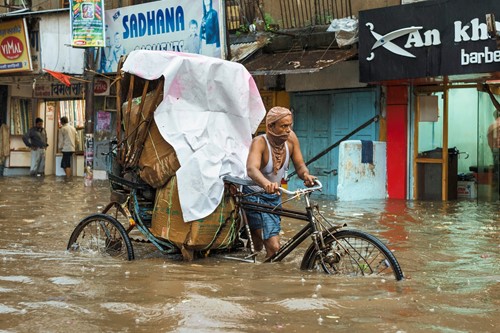The commitment by developed countries at the COP29 UN conference to channel $300 billion a year to developing countries by 2035 to ramp up climate action fails to address the enormity of the decarbonisation and adaptation challenge facing developing nations like India, the country’s representative to the conference has warned.
News
COP29 climate finance deal for developing nations ‘abysmally poor’, warns India
The COP29 (Conference of Parties) climate summit in Baku, Azerbaijan, concluded on a dramatic note with India strongly objecting to a climate finance deal for developing countries agreed in the final hours of the summit on 24 November.
The adoption of the Baku Finance Goal (BFG) almost did not happen, but at the eleventh hour, negotiators were able to finalise an agreement that developed countries would provide at least $300 billion annually to developing nations by 2035 to help them transition to cleaner energy and adapt to climate change, with a broader target to scale up financial assistance to $1.3 trillion a year by 2025. The target involves financial contributions from “all actors,” including private businesses and voluntary contributions from developing nations themselves.

However, India rejected the agreement, calling it insufficient and inequitable, as it fell well short of the $1.3 trillion that countries most vulnerable to climate change were calling for. The provisions for prioritising climate change adaptation finance to the world’s least developed nations and small island states were deemed inadequate, with India emphasising the need for equitable and timely climate finance. India’s public objection was revealed moments after the deal had been formally adopted by consensus.
Delivering India’s statement, Chandni Raina, an adviser at India’s Department of Economic Affairs, described the manner in which the deal was adopted as unfair” and “stage-managed”, according to a report from the Press Trust of India.
Raina was scathing about the new climate-finance package, criticising the pledge of $300 billion a year by 2035 as “too little and too distant”. She labelled the sum “abysmally poor”, “paltry” and an ”optical illusion” – arguing it was a far cry from the $1 trillion developing countries need every year to cope with the warming world. Raina flagged three major issues for India in the deal – paragraphs 8a, 8c and 9 of the agreement.
Para 8a suggests that the $300 billion will come from a variety of sources – public, private, bilateral multilateral – and not directly as public money from developed to developing countries. However, developing countries have long demanded grants or grant-equivalent funding for climate action, rather than loans that burden them with debt. Many poorer nations already spend up to 10 per cent of their GDP on servicing debt. Also, paras 8c and 9 allow developing countries’ contributions – whether through their funding to multilateral climate finance (MDBs) or their own bilateral climate finance – to be voluntarily counted towards the $300 billion goal.
Essentially, Global South countries might end up footing their own climate bills – which critics say is hardly in the spirit of ‘climate justice’. Raina called it a “deflection” of developed nations’ responsibilities.
There have also been questions about why India did not publicly mention these issues at the heads-of-delegation meeting on Saturday 23 November, the penultimate day of the conference, or even earlier. However, India had in fact raised its concerns throughout the two-week conference. From high-level dialogues on a just transition, pre-2030 ambition, climate finance and adaptation finance to the Mitigation Work Programme and its national statement, India had consistently made its case, aligning with the group of Like-Minded Developing Countries, known as the LMDC.
Speaking at a webinar titled: Did the Finance COP Deliver?, hosted by the New Delhi-based Centre for Science and Environment (CSE), one of India’s leading environmental research and campaigning bodies, on 28 November, director general Sunita Narain, said: “At COP 29, we lost an opportunity – without a meaningful agreement on climate finance; both in terms of quantity and quality, large parts of the world that would have had the chance to reinvent growth to make it low-carbon intensive, will not be able to do so.”
What’s worse, this comes at a time when these countries are even more vulnerable due to climate change impacts, Narain added.
Avantika Goswami, CSE’s climate change programme manager, argued that the deal falls woefully short of the needs and expectations of the Global South. “The Global North has abandoned the Global South with this meagre offer. It has no right to demand mitigation ambition from our part of the world with so little finance on the table,” she stated.
The lack of clarity on whether the $300 billion would be grants-based or concessional raises concerns about the possibility of worsening debt burdens in the Global South. Moreover, the agreement’s framing of the broader $1.3 trillion finance target as a goal from “all actors” transfers much of the burden to the private sector, which has historically contributed only a fraction of the needed finance.
"The ambiguities of the goal make it clear that there will be little accountability and traceability of funds,” Goswami said. “This was the last remaining window for the Global North to step up, pay its fair share, and restore some semblance of trust in the multilateral process. They have failed.”
NEWS

Sexual misconduct in dentistry: former GDC fellow warns of ‘culture of silence’
By on 05 February 2026

Campaigners welcome work-related road safety charter in strategy to reduce road deaths
By on 15 January 2026



